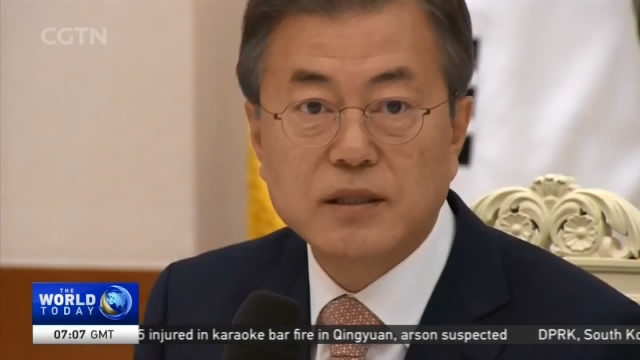
15:49, 24-Apr-2018
Korean Peninsula Diplomacy: Inter-Korean summit: Kim and Moon's contrasting personalities
03:01

A summit between the leaders of the divided Korea could ease the diplomatic thaw or plunge the peninsula back into a cold war. But will Kim Jong-un give up his new nuclear arsenal? What can Moon Jae-in sacrifice to make this happen? Our Jack Barton looks into the two leaders' backgrounds to get a sense of how they might reach a deal.
Kim Jong-un rose to power in 2011 after the death of his father Kim Jong-il. Big question at the time over what sort of leader he would make have now largely been answered.
ANDREI LANKOV DIRECTOR OF KOREA RISK GROUP "He is smart, cold-minded, Machiavellian, manipulative and if necessary quite harsh and brutal, but really pragmatic and highly reasonable, a highly rational leader. He is probably the best choice for his job in the very peculiar situation his country and his regime finds itself in right now."
The son of Korean War refugees Moon Jae-in rose from humble origins to become a human rights lawyer before turning his hand to politics. Moon earned a reputation as a peace-seeking dove, perhaps because he knows from personal experience just how height the stakes are.
JACK BARTON PANMUNJOM "President Moon served in the special forces here at the DMZ back in 1976 when he was part of the mission responding to the axe murder of two American soldiers by DPRK troops, which created a standoff so intense many analysts at the time were predicting it would trigger World War Three."
No surprise then that Moon has made striking a deal a top priority.
DANIEL PINKSTON LECTURER IN INTERNATIONAL RELATIONS, TROY UNIVERSITY "Besides legally I think he is emotionally and personally committed to that, so this is what he has to do, he has public support, but there are concerns from some conservatives and others that he might be too eager and make too many concessions to North Korea, without North Korea committing to verifiable denuclearization."
Many analysts believe the leaders have enough mutual interests right now to get a deal done that is still acceptable to Washington.
ANDREI LANKOV DIRECTOR OF KOREA RISK GROUP "Right now the major worry in both Seoul and Pyongyang is not a possible conflict between two Korean states, but a possible strike by the Americans. They want to create a situation which would make such a strike highly unlikely."
Despite a weapons test freeze Kim Jong-un has made it clear he intends to keep his existing weapons, raising concerns the end deal might resemble the same commitment most major nuclear powers signed onto during the Cold War: full nuclear disarmament at a pace that could take decades or centuries. Jack Barton, CGTN at the demilitarized zone.

SITEMAP
Copyright © 2018 CGTN. Beijing ICP prepared NO.16065310-3
Copyright © 2018 CGTN. Beijing ICP prepared NO.16065310-3